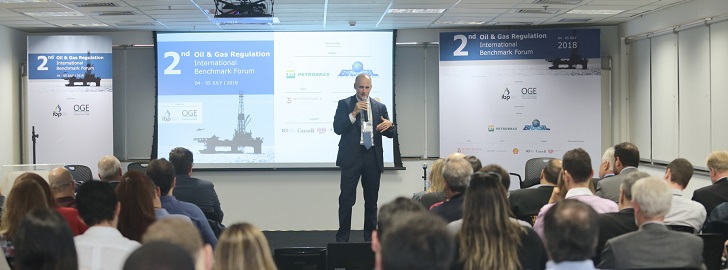IBP and OGE gathered specialists from Norway, Canada, UK and Brazil to discuss regulation

Forum debated international initiatives for energy transition, environmental legislation and natural gas market, as benchmarks to the Brazilian industry
The Brazilian Petroleum, Gas and Biofuels Institute (IBP), in partnership with OGE – Oil. Gas. Energy. -, headed the second edition of Oil & Gas Regulation International Benchmark Forum. The event gathered agents from traditional oil and gas producing countries – aiming to promote network about governance in the environmental licensing process, low carbon economy trends and regulatory challenges to broaden the natural gas market.
According to Luiz Costamilan, IBP Natural Gas Executive Secretary, Brazil is becoming the offshore worldwide capital and everyone is observing the Brazilian oil and gas sector. Even recent industry changes have created many opportunities, yet some challenges remain.
“Unfortunately the environmental framework challenges are the same from last year, when we discuss the topic at the first edition of the forum; at this second edition we are focusing on the balance between environmental preservation and the oil and gas industry development. Brazil has considerable natural gas volume, considered as a platform in the process of the low carbon economy transition”, explained Claudia Rabello, OGE – Oil. Gas. Energy. – CEO.
The exchange between specialists approached regulatory aspects from each country and its effects on investments security. “Unfortunately, it’s not possible just copy and paste the oil and gas industry best practices, because Brazil has its own peculiarities – as all the countries. We need to embody and “tropicalize” these practices to our reality. This is our homework”, affirmed José Gutman, ANP executive secretary in the Forum opening.
Energy transition
In the first panel, Gunnar SjØgren, Norwegian Petroleum Directorate (NPD) director, reviled actions and investments that Norway is doing to migrate to a low carbon economy. Presently, 99% of all energy generation in the Nordic country comes from hydroelectric power, considered low-cost, clean, flexible and trustworthy.
“Norway is also waging in wind power from the construction of the largest land-based wind power plant of Europe. Our belief is that the six wind farms produce 1.000 GWh by 2020. The foreseen investment on this energy sector is € 1,6 billion “, said Gunnar.
Other important aspect is the type of transport used by Norwegians – 25% of all cars are electric and the percentage has been quickly rising. “On June, we listed that 50% of new cars used on the streets are rechargeable”, added.
In Canada, the federal government defines guidelines that provinces should follow. In 2015, the total of greenhouse gas emissions in the country was 772 megatonnes (Mt) of carbon dioxide equivalent (CO2 eq). The Paris climate agreement commits the country to reducing that total to 517 megatonnes by 2030, as explained Corey Froese, International Center of Regulatory Excellence (ICORE) / Alberta Energy Regulator (AER) director.
“The country is committed with the Pan-Canadian Framework on Clean Growth and Climate Change, which englobes clean technology, innovation, job creation, approach to pricing carbon, and specific mitigation opportunities.
Furthermore, incentives and governmental policies are guiding the energy transition in UK – even the solutions are conducted by the market. According to Peter Cameron, Energy Markets Global Limited director, the UK emissions fell 6% in 2016. That result was achieved after improvements in energy efficiency meant a reduction of 2% in overall energy consumption. Besides that, three big coal plants were shut down in 2016, reducing the proportion in UK from 2,7 billion tons in 2015 to 22.000 tons on the later year.
Environmental framework
On Norway, to operate in the country and participate in bidding rounds, the companies must be qualified as an operator by national authorities, describing its technical capabilities, financial and environmental, as well as offshore exploration and production experiences. Being qualified to operate, the companies don’t need environmental licenses, and are authorized to begin the activities just after sing the concession contract.
“The actual legislation establishes strict requirements related to each company responsibility: risks identification and reduction, and report ability. The management of major-accident hazards is prerequisite for oil operations in the country”, explained Gunnar.
The environmental rules for each area to be explored are predefined by Norwegian authorities and must be fully accomplished by the companies, there’s no surprise. “There is negotiation only in technical programs. The operators need to notify the government agencies how will reach the established conditions – unlike some countries where the authorities point out what companies should do”, stated.
On Canada, the government also determines only the expected environmental results. The environmental requirements or restrictions are defined based on the nature of the risk.
On the United Kingdom, as the government is in charge of legislation, the environmental requirements are established by industry associations. The operational security system is based on KPIs (Key Performance Indicators).
A governmental agent is in charge of this inspection and has authority to inspect. Because it is a very extensive region, the number of required licenses to operate depends on each location. While England and Wales demand only one, issued by the environmental agency or equivalent local authority, Scotland requires two licenses and Northern Ireland, three.
Natural gas Market
This panel debated topics as regulation of third-party access to transport facilities, market diversity need, market price mechanisms and transport infrastructure.
Thus, gas regulatory reform, on hold at Congress, is essential. The General Coordinator for Processing, Infrastructure and Logistics for the Ministry of Mines and Energy, Aldo Barroso, expects that the gas bill replacement should be approved by August.
The 2nd Oil & Gas Regulation International Benchmark Forum was sponsored by Petrobras, Shell, Mattos Filho, and Faveret Lampert, supported by the Chamber of Commerce Brazil-Canada (CCBC), Consulate General of Norway, Consulate General of Canada, British Consulate General and Brasil Energia magazine.